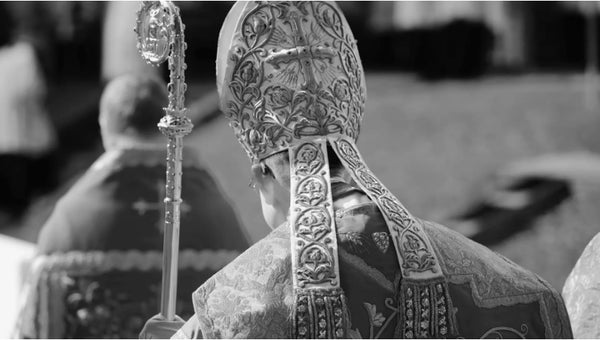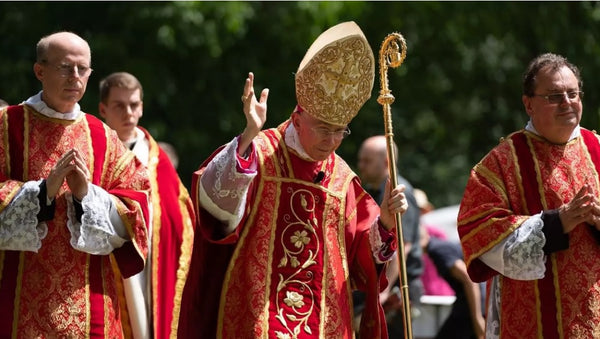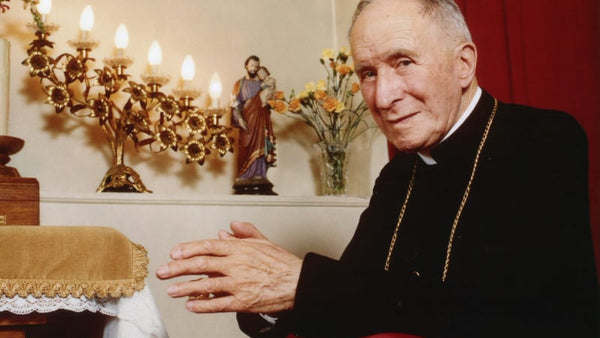THE CHOICE OF ROME

THE CHOICE OF ROME, by Archbishop Marcel Lefebvre
I believe I must add some words to draw the attention of our priests and our seminarians to the indisputable fact of the Roman influences on our spirituality, on our liturgy, and even on our theology.
One cannot deny that this is a providential fact. God, who leads all things, has in His infinite wisdom prepared Rome to become the Seat of Peter and center for the radiation of the Gospel. Hence the adage: Onde Cristo è Romano.
Dom Guéranger, in his Histoire de sainte Cécile, recounts the great part which members of great Roman families played in the foundation of the Church, giving their goods and their blood for the victory and the reign of Jesus Christ. Our Roman liturgy is the faithful witness of this.
Romanitas is not a vain word. The Latin language is an important example. It has brought the expression of the Faith and of Catholic worship to the ends of the world. And the converted people were proud to sing their Faith in this language, a real symbol of the unity of the Catholic Faith.
Schisms and heresies are often begun by a rupture with Romanitas, a rupture with the Roman liturgy, with Latin, with the theology of the Latin and Roman Fathers and theologians.
It is this force of the Catholic Faith rooted in Romanitas that Freemasonry wished to eliminate by occupying the Pontifical States and enclosing Catholic Rome in Vatican City. This occupation of Rome by the Masons permitted infiltration of the Church by Modernism and the destruction of Catholic Rome by Modernist clergy and Popes who hasten to destroy every vestige of Romanitas: the Latin language, the Roman liturgy. The Slavic Pope is the most determined to change the little which was kept by the Lateran Treaty and the Concordat. Rome is no longer a sacred city. He encourages the establishing of false religions in Rome itself, accomplishing there scandalous ecumenical meetings. He everywhere pushes for “inculturation” in the liturgy, destroying the last vestiges of the Roman liturgy. He has modified in practice the status of the Vatican State. He has renounced coronation, thus refusing to be a Head of State. This relentlessness against Romanitas is an infallible sign of rupture with the Catholic Faith that he no longer defends.
The Roman pontifical universities have become chairs of Modernist pestilence. The coeducation of the Gregorian is a perpetual scandal.
All must be restored in Christo Domino—in Christ the Lord, in Rome as elsewhere.
Let us take delight in seeing how the paths of Divine Providence and Wisdom pass through Rome. Our conclusion will be that one cannot be Catholic without being Roman. This applies also to Catholics who have neither the Latin language nor the Roman liturgy. If they remain Catholic, it is because they remain Roman—like the Maronites, for example, by the ties to the Catholic and Roman French culture which formed them.
It is, moreover, an error to speak of Roman culture as Western. The converts from Judaism brought with them from the Orient all that was Christian, all that which in the Old Testament was preparation and could be a component of Christianity, all that which Our Lord had assumed and that the Holy Ghost had inspired the apostles to adopt. How many times do the epistles of St. Paul teach us on this subject!
God willed that Christianity, cast in a certain way in the Roman mold, should receive from it a vigorous and exceptional expansion. All is grace in the divine plan, and Our Divine Savior disposes everything as the Romans are said to act, that is, cum consilio et patientia or suaviter et fortiter—with counsel and patience, sweetly and mightily (Wis. 8:1). Ours is the duty to guard this Roman Tradition desired by Our Lord in the same way that He wished us to have Mary as our Mother.
Extracts from Spiritual Journey. This article taken from The Angelus Magazine, Jan/Feb 2015.
Also in News from Tradition

Death of Bishop Bernard Tissier de Mallerais

Prayer Intention for Bishop Tissier de Mallerais
We ask for prayers for His Excellency Bishop Tissier de Mallerais.
On the morning of Saturday 28 September, after the Angelus, he fell on the stairs of the seminary in Ecône and lost consciousness. He is currently in hospital.

Archbishop Marcel Lefebvre on the Feast of Christ the King
The following sermon for the Feast of Christ the King was delivered by Archbishop Marcel Lefebvre, founder of the Society of Saint Pius X (SSPX), on October 29, 1989 in Dublin, Ireland.
Today we must pray to Our Lord Jesus Christ, we must pray to the Blessed Virgin Mary to remain true Catholics and to do everything possible to become saints. We must come to church frequently, pray in our church, receive the graces of the sacraments in order to become saints, to sanctify our souls and to go to heaven with all the members of our families and all those who kept the Catholic Faith here on earth and now enjoy the happiness of heaven.

Brent Klaske
Author
Director of Operations at Angelus Press. I have worked in Catholic publishing for more than 20 years. I currently live near St. Marys, KS with my wife and 10 children.